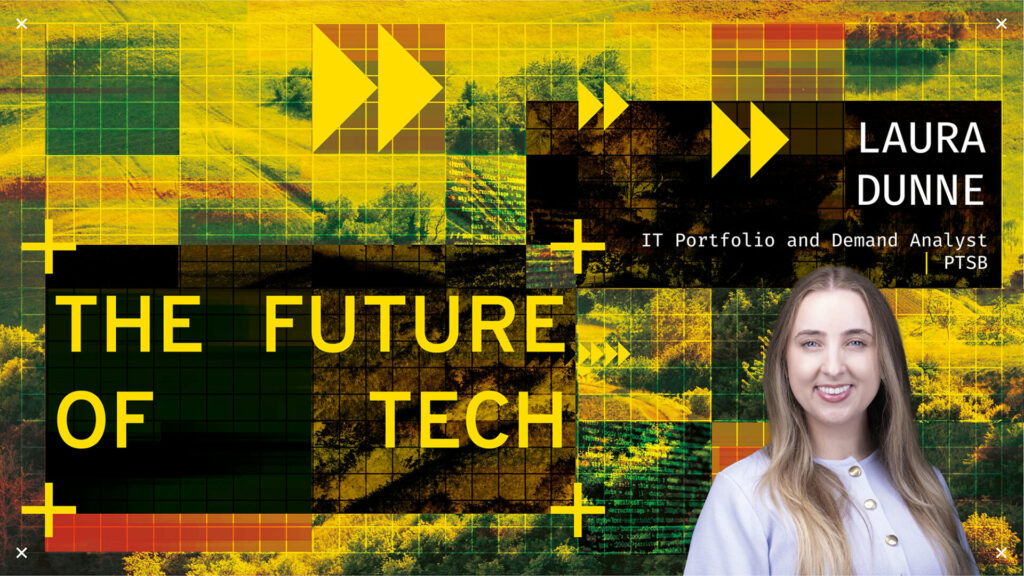Laura studied an undergraduate degree in Physiology at Trinity College Dublin, where she developed a fascination for biology and a love of data analysis. She went on to complete a Master’s in Bioinformatics and Computational Biology at UCC, a discipline at the intersection of biology, computer science, and data analysis, which served as the perfect bridge between her scientific background and her growing interest in analytics. After working as a bioinformatician analysing large-scale genetic datasets, Laura realised her true passion was not the specific subject matter of the data, but the process of analysing, visualising, and extracting insights. This led her to transition from academia into industry. She first worked as a Data Automation Analyst before moving to her current role as an IT Portfolio and Demand Analyst at PTSB.
Are there any projects you have worked on that you felt made a real impact?
In terms of more specialist, out-there techniques, the biological data work I was doing was quite striking. I was in a lab focused on the gut microbiome, which is a hot topic at the moment. My work was focused on identifying viruses in the gut and whether they had roles in diseases like Parkinson’s. It was interesting to be in an area that could have a real impact on human health. In terms of more immediate, day-to-day impact, it’s definitely the work I’m doing now. It’s not particularly wild or experimental, but I am focused on unlocking insights that leadership and management in the business haven’t previously had access to. It is very fulfilling to be able to answer questions and back up hunches with data. Unlocking these data-driven insights has been a real game-changer in my current role.
Is there an emerging, fast-growing area of tech that has the potential to have a significant societal impact?
I may be a bit biased, but MedTech is an area I love and find so interesting. In terms of benefits to society, MedTech will punch well above its weight in the number of people it can help and the quality-of-life improvements it can bring. But it’s not the be-all and end-all.
There are other areas that can have a huge impact. I would like to see changes at the individual level; people being empowered to work smarter and more effectively. I have experienced it myself: when you can escape the drudgery or menial tasks, when you automate them or use AI to take grunt work off your plate, it enables higher-level thinking and strategy.

Are there any technologies or trends that are overrated or underrated at the moment?
In science, when something new and shiny comes out, everyone can be quick to think it can be the solution to all our problems. However, within a few years, its actual usefulness becomes apparent. There are also moves we might not want to make, for example, eliminating all entry-level jobs that can be automated by AI. We need entry-level talent and a pipeline of new people, because that’s how they grow and develop.

Something I think is still hugely underrated on the analytics side is Embedded Analytics. Currently, to access analytics and insights, most users will need to open a BI tool like Power BI to seek out dashboards and visualisations. However, people are often busy and tend to move quickly, so they don’t take the extra step to seek out the analysis. This leaves a lot of laboriously created dashboards under-utilised and end-users less well-informed. I would see huge benefit in moving toward a world where relevant insights are embedded within the tools and systems people are using day-to-day.
Technology moves at such a rapid pace. Who do you think benefits most from the direction and pace of tech? And who gets left behind?
The more tech-literate among us are benefiting, as we can keep up with the pace of development and change. We utilise tools like AI automation, which speeds up our work and allows us to focus on higher-quality tasks.
But I think there’s a huge risk of certain cohorts of people being left behind by the rapid pace of technological advancements. For example, Ireland has an ageing population. There are many people who are not tech-literate, especially older people, who aren’t comfortable with tech. We also don’t want people with disabilities to be left behind in a more tech-focused world.
We have the time now and the foresight to make sure we are building and preparing for a world where those people will not be left behind. We need to bring everyone along on the journey and not make tech so high-level that it becomes a barrier to entry for those less familiar with it. That’s something we need to be very proactive about, bringing people into the fold, not just taking off to the races with the latest, shiniest piece of technology.
Are moving too fast, bringing in and employing new technologies without really understanding what we are doing or what the longer-term consequences might be?
It’s a balancing act. There are certain industries that need to operate at the fringes and push boundaries; that’s where progress comes from.

However, there are areas where more caution is needed. If I think of myself, who has my data? The government with my personal data, the bank with my money, and pharmaceutical companies with my medicine – those are areas where I want caution. There isn’t room to move too fast and break things; they need to be steady, measured, and thorough. These are highly regulated industries, so I think the balance is: we need people pushing boundaries, but we also need to exercise a lot of control where there’s highly sensitive data, sensitive information, or a big tangible impact on society. We need to move with care.
Do you think about data privacy a lot when you’re interacting online, beyond banking and healthcare, with things like social media?
Absolutely. We have seen time and time again how insecure our data can be when we hand it over to large companies. There are data breaches all the time, so it is something I’m very aware of.
Something I often think about is that when it comes to social media, if you’re not paying for the product, you are the product, or, more specifically, your data is the product. We are often the commodity these companies want access to our data so they can sell to us, predict our spending habits or behaviour. It’s not a perfect system; there are still plenty of flaws and plenty of breaches every single year.
Are we being empowered by technology, or exploited by it?
It’s probably a bit of both. We are quite lucky in Ireland to have the protections of the European Union, which often acts in the consumer’s best interest to make sure we aren’t being overly exploited. But it is a give-and-take relationship. We benefit, but at some cost, especially when our data is involved. There’s probably some exploitation there.

Whose responsibility is it to make sure technology is ethical? Does it lie with data professionals, companies, governments, or regulators?
I see it as everyone’s responsibility, but regulation needs to come from outside of organisations, as companies will always want to move quickly to get things to market. There should be a stronger emphasis on ethics in technology. Even with AI models and algorithms, there is often a black box, with very little transparency. In recent years, we have seen bias baked into technology, which is horrendous and something we don’t want to see going forward.
We need a conscious, proactive push to make sure diverse voices are in the room during development and deployment, and that we prioritise fair, ethical, transparent technology. That’s the only way to avoid bias propagating itself and to avoid losing sight of who’s really making these decisions or driving these algorithms.
Your generation has grown up with tech; you have never really known a world without it. What do you think it has given your generation, and what has it taken away?
Technology has given us a huge amount. As long as I can remember, we have always had a computer in the house, although I didn’t have a smartphone with internet access until my late teens. I saw a huge change in that time. Having access to knowledge at your fingertips is amazing. I went through school and college with internet access, which makes a huge difference. Social media has also brought global connectivity, which can’t be understated, but it has a dark side too – cyberbullying, for example.
I didn’t go through college with AI, and I think that’s a whole different minefield for younger students now. The college experience today is completely different from mine. There’s a lot that can be lost – resilience, capability, the skill of doing your own research. Having things served up too easily isn’t always good.
I also think of the efficiency tech has given us; online banking means we don’t have to wait in queues at banks that close at 5 p.m. We can move money and make payments instantly. But on the flip side, online gambling makes it easier than ever to spend huge amounts of money from your phone at home. It’s a double-edged sword. Every upside has a downside, and the challenge is keeping those in balance, so we don’t end up with hugely negative consequences.
When future generations look back at our era of tech now, what do you think they will say?
Overall, I would hope they could acknowledge the huge breakthroughs we have made in the last few years. I hope there’s some appreciation of how transformative this era of technology is.
Simultaneously, I anticipate that there will be some sense of, “They had that completely overblown.” A bit of an emperor has no clothes moment, where we thought that technology was going to be the solution to everything, the magic button that would fix it all.

Perhaps there might also be a reflection on our naivety in terms of data privacy, how much we gave away, and how exposed we were online. I hope that in 10–15 years, we will have reached more of a happy place in terms of data privacy and the use of AI. I think it will all have shaken out to a more even keel.
What is the Future of Tech?
I would love to see a future where technology is enhancing and enabling us to do what we love to do. Speaking specifically in the context of work, it frees us from menial or repetitive activities, giving us the time to work at a higher level, think strategically, interrogate data, and layer human context over it to drive decision-making and analyse impact.

Check out all of the interviews in our Future of Tech series here>>> , listen on Spotify>>>> or watch the videos on our LinkedIn page>>>>


 Jump Back
Jump Back

